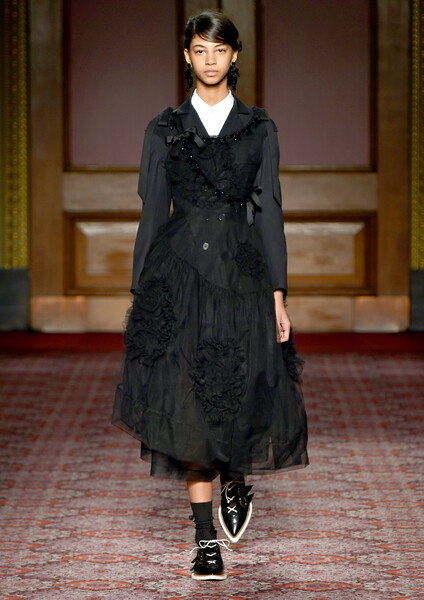Films
Simone Rocha on Louise Bourgeois
Fashion designer Simone Rocha reflects on the work of Louise Bourgeois ahead of the inaugural exhibition at Hauser & Wirth St. Moritz, “Louise Bourgeois. Papillons Noirs,” opening 28 December 2018.
Rocha first encountered the work of Louise Bourgeois at the age of 16 in the exhibition “Stitches in Time” at IMMA Irish Museum of Modern Art, Dublin. Co-curated by Frances Morris, Tate Modern and Brenda McParland, IMMA, this exhibition examined the role of autobiography and identity in Bourgeois’s work, and her family connections to furniture and tapestry making. Her mother and maternal grandparents originated from the French town of Aubusson, famed for its textile industry, and her mother ran a tapestry restoration workshop. Bourgeois came to associate sewing with the act of reparation: “I’ve always had a fascination with the needle, the magic power of the needle. The needle is used to repair the damage. It’s a claim to forgiveness.”
“Papillons Noirs” includes a series of black fabric heads from the last decade of Bourgeois’s life when the artist was in her late eighties and early nineties. In these works, Bourgeois layered hand-sewn scraps of black terry cloth, tapestry, and fragments of her own clothing to form the features of her fabric heads. Employing familial techniques from her childhood, Bourgeois confronted her past literally and metaphorically, stitching together scraps of old fabric to gain a semblance of understanding and reconciliation. For her, art was inextricably entwined with personal experience—it was a channel through which she explored the depths of her emotions. In her art-making, Bourgeois fused the intensity of the moment with memories of events and people from her past.
“Femininity means so many things and it can be ugly, beautiful, grotesque, emotional, physical. I think that’s what is amazing about Louise’s work, that it’s so personal to her but it feels so personal to you.”

Louise Bourgeois, Untitled, 2002 © The Easton Foundation / VAGA at ARS, NY / ProLitteris, Zurich. Photo: Christopher Burke

Simone Rocha Autumn/Winter 2018
Bourgeois was not concerned with traditional portraiture or an image of any one individual, but instead with the effect that the individual can have on another, and the emotional dynamic played out by the encounter with the other. With her fabric heads, she explores a range of psychological expressions and complex emotional states—love, sexuality, suffering, and death—through the heads’ features and the ways in which they have been constructed and sewn. The maternal, feminine, and familial aspects of fabric provide a sense of tenderness. With these deeply intimate forms, Bourgeois revealed many facets of the human experience, and conceived a beautifully haunting language that extends far beyond her life.
“I think that clothes are definitely a form of portraiture. Anytime the collection is starting it's always very physical, emotional and personal.”
Simone Rocha’s design process is strongly influenced by autobiography and family. Working in her father John Rocha’s atelier between the ages of 13 and 18, Rocha went on to train at the National College of Art and Design, Dublin and at Central Saint Martins, London. Her collections have gained her some of the most prestigious stockists in the world including Dover Street Market, Browns, Colette in Paris, Ikram in Chicago, Bergdorf Goodman and 10 Corso Como in Milan, Seoul and Shanghai. As well as artistic inspiration, Rocha’s work looks back in time to explore historical forms and timeless beauty in her contemporary interpretations of femininity. The designer’s Autumn / Winter 2018 collection uses texture and layering to re-interpret the 19th century in a way that feels real, modern and female today.
